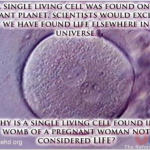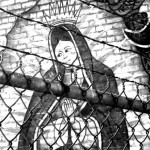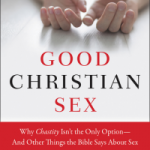Today, I have a guest post for you all from T E Hanna. He shares his thoughts–from the perspective of a male pastor–on reclaiming and embracing feminine images for God.
T E Hanna is the author of Raising Ephesus: Christian Hope for a Post-Christian Age and he writes regularly on issues of faith and culture on his blog at TEHanna.com.

In 2007, the Pew Forum for Religion and Public Life released a short synopsis of the gender makeup of the various world religions that shape the religious landscape of the United States. For many of us that are clergy, it was no real surprise that women consistently made up the majority of the population across every Christian tradition. What I was not prepared for, however, was the sudden awareness that this was unique to the Christian faith. The moment we broke out of the Christian denominations, the numbers flipped: Islam, Judaism, Hinduism, Buddhism, and even the religiously unaffiliated were all predominantlymale. Something about Christianity uniquely connects with women, and yet the Christian leadership structures are almost consistently male.
This gender gap should alarm us.
As a male pastor, I suppose I am to be counted among the masculine leadership that shape part of the divide. Thankfully, I have had the opportunity throughout my ministry experience to work both alongside and under the leadership of female clergy. In the process, I have discovered that there is a richness that a feminine perspective brings to the faith, a kindling spirit that breathes new life into old theologies. It was from such women that my eyes were opened to the vibrant femininity that is part of the identity of the God of Abraham, Isaac, and Jacob. This same femininity grabbed hold of the ancient patriarchs, the writers of the wisdom literature, and even the early church fathers.
It is a perspective I fear we have lost.
We often skip over the opening chapter of scripture. If we do linger upon it, it is often due to some petty debate regarding origins. We love to cite how mankind is made in God’s own image, often in an attempt to revel in our own uniqueness, yet we rarely focus on the gender references. To an ancient audience, however, the claim that both male and female were formed to reflect the very image of the creator must have had monumental ramifications. Women, after all, were viewed as property in an ancient patriarchal world. That we suddenly imbue women with divine characteristics — and God with feminine characteristics — was powerfully counter-cultural.
As scripture continues to unfold, we begin to see what some of these characteristics are. In Proverbs 1:20, we read that “Wisdom cries out in the street; in the squares she raises her voice.” Six verses later, we discover that Wisdom is, in fact, God. In switching to the first person, God begins declaring judgment by stating that “…I have called and you refused” (Proverbs 1:26). In scripture, the wisdom of God is not only displayed as a feminine trait, she is personified as a feminine God.
Jesus also depicts the Father in the feminine. In the Gospel of Luke, he teaches us how the Father is like a woman looking for a lost coin, earnestly seeking after us (Luke 15:8). In referring to his own love for us, Jesus characterizes this, too, as a female attribute. Lamenting over Jerusalem, he likens himself to a mother hen, yearning to gather his children under wing (Matthew 23:37). Thus we see critical aspects of God’s character — that God is wise, that God seeks us out, that God loves and nurtures us — as attributes of the feminine.
This does not mean, of course, that we are to turn and strip God of his masculine attributes. He is still King, He is still Father, and He is still Lord. It does mean, however, that when we begin to define God solely through masculine constructs we lose something integral to the faith. To the early church, the marriage of masculine and feminine attributes were essential to a well developed theology. To this end, we see apostolic writings from the likes of Clement, Justin, and Theophilus that refer to the paradoxical “womb of the Father”.
I fear that we have lost much of the beauty that the early church found in God’s femininity. To be sure, I find solace in knowing that God is victor, provider, protector, redeemer, and king. I adore the fatherly attributes that we so easily proclaim. I feel robbed, however, that it took me so long to come to know God as mother, as nurturer, and as perpetual creator.
As a pastor, I celebrate that we have so many females in our congregations. Perhaps one day we will similarly recover the female in our theology.















